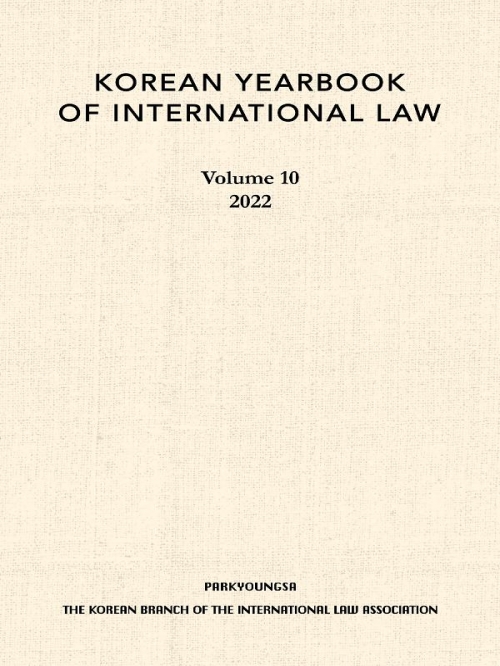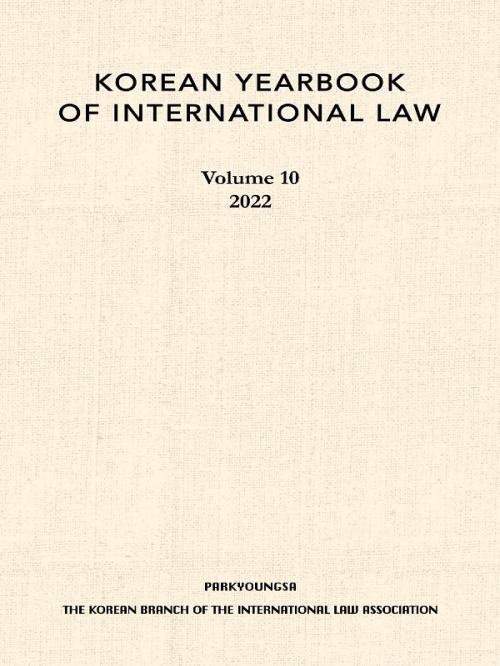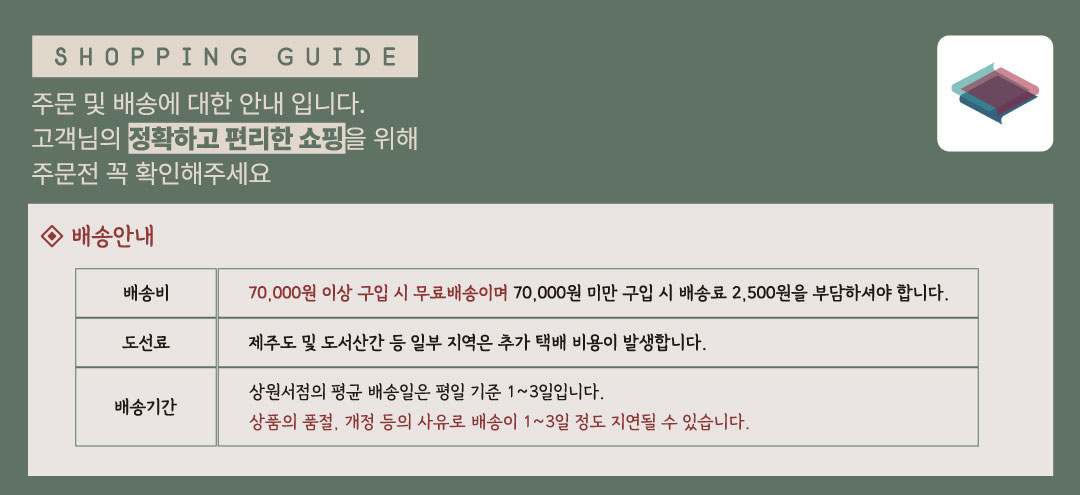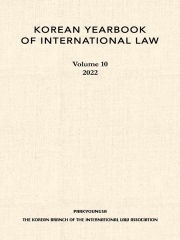상품상세정보
★★★ 예약상품 주문시 함께 주문하신 모든 도서는 예약상품이 출시된 후 함께 발송됩니다. ★★★ 분철상품 은 결제완료후 제작에 들어가는 주문제작상품입니다. 1) 일반도서보다 1~2일 발송이 지연될 수 있습니다. 2) 주문접수 이후 교환, 취소, 환불이 불가능합니다. ★★★ 토요일 은 발송 업무만 운영하고 있으며 고객상담 및 문의응대업무는 운영하지않습니다. 따라서 금요일 오후 6시 이후 주문건은 결제완료 이후 취소 및 변경이 불가능합니다. |
책소개
- The Korean Yearbook of International Law has reached its tenth volume, and as will sometimes happen over the course of a decade, we have suffered a loss within our community. Professor Choi Seung-Hwan of Kyunghee University Law School, the first President of the Korean branch of the International Law Association, passed away suddenly while this volume was being prepared. A driving force behind the publication of the Yearbooks, he is and will be much missed. For more, please refer to the Editorial Board’s moving tribute to Professor Choi in the beginning of this volume.
- As we carry on with Professor Choi’s vision to continue and improve the yearbook as a reference abroad for Korea’s international legal practice, the current volume has come together under a broad theme of risk to international exchange. Navigation, trade, business, and immigration across borders create bounties of opportunity. At the same time, these interactions and interfaces are also sources of legal, health, environmental, and other risks.
- International law, both public and private, is a major means of managing and mitigating the risks that arise out of international exchange and cross-border issues. The current collection of articles and reports delve into this role of international law in a variety of contexts and circumstances.
- The article Legal Status of Marine Scientific Research in the Law of the Sea by Professor Lee Chang-Wee examines the Law of the Sea rules applicable to marine scientific research and the conflicts over these rules, most prominently between China and the United States, for a dynamic view of these much-contested rules. Marine research is a leading example of an activity rife with both opportunities (scientific and economic) and risk (security and military), and state behaviors surrounding the international law in this area demonstrate the high stakes of deciding how international law will manage the risks.
- The Meaning of “Service” as One of the Requirements for Recognition and Enforcement of Foreign Judgments by Judge Kim Young-Seok looks at service of process in international litigation. Litigation across borders, along with the recognition and enforcement thereof, is a vital means of managing cross-border risks, while service of process allows individuals to be notified of and respond to the legal risk that such litigation raises in turn. Judge Kim gives a thoughtful and nuanced exploration of a landmark decision by the Korean Supreme Court in this field, in the process making the crucial distinction between legality of the service of process itself under domestic law (Korean law, in this case) and its being a requirement for recognition and enforcement.
- Judge You Jung Hwa’s article, Private International Law Issues in Joint Venture Agreements and Shareholders’ Agreements Governed by Korean Law, takes a look at the sometimes tangled issues that arise in the interface between different jurisdictions, and proposes several strategies for the advance separation of contract and corporate legal aspects to manage disputes that may arise out of joint venture agreements.
- Attorney Han Mino’s article, Revisiting Optional Arbitration Clauses Before the Korean Courts, critiques a major Korean Supreme Court judgment that deemed optional arbitration clauses ineffective unless both parties consent. Attorney Han then goes on to argue that courts should take a more pro-arbitration stance to resolve practical confu- sion over the validity of these clauses. Expanding the effectiveness of optional arbitration clauses would certainly change the calculus of dispute and legal risk management, and it remains to be seen if the Korean courts will listen to these calls.
- Dr. Chung Min Jung opens the Special Reports section with a breakdown of the Constitutional Court’s 2020 decision on renuncia- tion of nationality by Koreans who hold multiple nationalities. The balance between individual rights and the need for a large, ready military force through mandatory military service has always been a delicate one in Korea, yet the thorough treatment by the Special Report shows that individual rights and practicality are not necessarily in tension: The Constitutional Court’s reasoning is clear that disallowing the relinquishment of Korean nationality after the nationality selection period not only causes undue hardship for the multiple nationality holders, but is also impractical for military purposes.
- The subject of Professor Lee Jang-Hie’s report, the Inter-Korean Basic Agreement of 1991, may be characterized as a major push by the two Koreas to manage and mitigate perhaps the single greatest geopolitical risk on the Korean peninsula and the surrounding region: that of military tension and, at the extreme, another Korean War. By examining both the substance of the Agreement in its usefulness to building a framework for Korean peace, and its form which Professor Lee argues meets the requirements of a binding international treaty, the conclusion is reached that the Agreement should be implemented by both Korean governments and leveraged as a foundation for lasting peace.
- Professor Lee Gyooho’s special report on industrial security laws in the Republic of Korea outlines the state of the law on industrial security and argues for greater coordination with Japanese law, as South Korea and Japan are two of the states most affected by security concerns in their high-tech industries. This may be an emerging area of cooperation and coordination to manage security risks in these industries.
- In a special report on the normalization of Korea-Japan relations in the Yoon Suk-Yeol administration, Professor Hong Sungkee makes comparisons between the Korea-Japan relations policies of the current administration an past ones, and argues for a productive way forward for the two countries beyond historical gridlock based on the foundational legal principle that a contract must be honored.
- Dr. Doh See-Hwan, a recurring and valued contributor to the Yearbooks, contributed a special report on the invasion of Dokdo and the Korea-Japan treaty in 1905 through the lens of the San Francisco Peace Treaty in 1951. Dr. Doh argues that Korea’s sovereignty over Dokdo and the illegality of Japan’s annexation of Korea are confirmed by the San Francisco Peace Treaty, making a firm grounding in international law a vital part of East Asian peace and justice going forward.
- In the Recent Development section, Professor Lee Seok-Yong comments on military activities in other states’ exclusive economic zones (EEZs), which is all the more interesting read together with Professor Lee Chang-Wee’s article on the legal aspect of marine scientific research. Military activities in EEZs are reasonably viewed as another front in the struggle between states over the law of the sea, which is not an abstract academic argument but often a matter of security and even survival.
- Dr. Chung Min Jung reported on the Korean National Assembly’s international law resolutions taken in 2022 and added insights such as the decrease in the quantity of international law resolutions undertaken by this body, including human rights resolutions. The five international law resolutions by the Assembly in 2022 mainly concerned geopolitical issues, marking a departure from prior years when human rights resolutions were more dominant.
- Professor Won Jae-Chun provided a timely report on the international investor arbitration tribunal ICSID’s decision in Lone Star Holdings vs. Republic of Korea, pointing out where the decision fell short and presenting directions the Korean government could seek in the rectification proceedings. Investor claims like the Lone Star Holdings case represent a major risk for states in their government policy and enforcement actions, and these experiences along with commentary on them will prove valuable going forward.
- In Contemporary Practice and Judicial Decisions, Judge Hong Eungi presents judicial decisions in public international law, including the arrest of foreign nationals and their right to be notified of the right to have the consuls of their country of nationality notified; the legality of a deportation order of a refugee that does not specify the country of repatriation; and the recognition of gender change for transgender people with minor children.
- This final section is rounded out by translations of the Quarantine Act, Framework Act on Carbon Neutrality and Green Growth, and Space Development Promotion Act, together with Judge Jang Jiyong’s summary of judicial decisions in public international law including the applicability of the CISG, assumption of obligations, formation of marriage, and recognition of a threefold damage awarded by a foreign court.
- The depth and breadth of the articles and reports in this volume come together to form a picture of Korean international legal practice in 2022 of responding to new and known risks at all levels, through the international legal process, legislation, litigation, diplomacy, judgments, resolutions, and more. This is a truly dynamic and multilayered process that no one book can hope to capture the entirety of, but the Korean Yearbook of International Law delivers at least one slice of this organic, pulsing process for a year. Though I may not agree with all the selections and some of them have contrasting viewpoints, perhaps this, too, is a reflection of the contradictions and strife inherent in the course of international law.
- This volume also marks the end of the tenure of the current editorial team led by Professor Lee Gyooho, including myself as the Executive Editor. Professor Lee and the team, including the tireless Ms. Choi Ji-in as the staff editor, deserve all accolades for their energetic dedication and unending patience. For myself, it has been a privilege working with the scholarly output of so many talented scholars and practitioners. I wish the succeeding team every success in continuing this important work.
- LEE Jee-Hyung
- Executive Editor
목차
- EDITORIAL NOTE
- LEE Jee-Hyung
- ARTICLES
- LEE Chang-Wee
- Legal Status of Marine Scientific Research in the Law of the Sea: Conflicts over Codification and Policy-Oriented Jurisprudence as a Solution
- KIM Young-Seok
- The Meaning of “Service” as One of the Requirements for Recognition and Enforcement of Foreign Judgments -Focusing on the Supreme Court of Korea 2017-Da-257746 Judgment-
- YOU Jung Hwa
- Private International Law Issues in Joint Venture Agreements and Shareholders' Agreements Governed by Korean Law
- HAN Mino, YOO Eun Kyung (Jennifer)
- Revisiting Optional Arbitration Clauses Before the Korean Courts
- SPECIAL REPORTS
- CHUNG Min Jung
- The Constitutional Court's Decision and Recent Legislation Related to Relief for Elapsing the Period of Renunciation of Nationality by Multiple Nationality Holders
- LEE Jang-Hie
- The Inter-Korea Basic Agreement of 1991 - Its legal nature and its role in the promotion of peace on the Korean Peninsula
- LEE Gyooho
- Industrial Security Laws in the Republic of Law: Comparison with their Japanese Counterparts
- HONG Sungkee
- Normalization of Korea-Japan Relations in the Yoon Suk-Yeol Administration: The Comfort Women Agreement and Judicial Decisions on Compensation for Forced Labor
- DOH See-Hwan
- International Legal Review of the Invasion of Dokdo and the Korea-Japan Treaty in 1905 resumed by the San Francisco Peace Treaty in 1951
- RECENT DEVELOPMENTS
- LEE Seok-Yong
- Military Activities in Other States’ Exclusive Economic Zones
- CHUNG Min Jung
- Resolutions Relating to International Law Adopted by the 21st National Assembly in 2022
- WON Jae-Chun
- ICSID Arbitration Tribunal Award on Lone Star Holdings v. Republic of Korea and Its ISDS Implications
- CONTEMPORARY PRACTICE AND JUDICIAL DECISIONS
- HONG Eungi
- Judicial Decisions in Public International Law (2022)
- LEE Jee-Hyung·PARK Hyeon-Seok
- QUARANTINE ACT
- LEE Jee-Hyung·PARK Hyeon-Seok
- FRAMEWORK ACT ON CARBON NEUTRALITY AND GREEN GROWTH FOR COPING WITH CLIMATE CRISIS
- LEE Jee-Hyung·PARK Hyeon-Seok
- SPACE DEVELOPMENT PROMOTION ACT
- JANG Jiyong
- Judicial Decisions in Private International Law (2022)
- Treaties/Agreements Concluded by the Republic of Korea
- INDEX
- AUTHOR GUIDELINES AND STYLE SHEET
교환 및 반품안내
※ 분철 및 제본상품은 교환 및 환불이 불가능 합니다.
- 도서 상품의 특성상 밑줄, 필기등의 사용흔적이 있는경우 교환 및 환불이 불가능합니다.
- 밀봉 도서 또는 상품의 경우 밀봉을 훼손하였을 경우에는 교환 및 환불이 불가능 합니다.
환불안내
- 상품 청약철회 가능기간은 상품 수령일로 부터 7일 이내 입니다. (반품배송비 구매자 부담)
- 무료배송상품을 환불요청하는 경우 최초배송에 소요된 배송비를 제외하고 환불해드립니다.
AS안내
- 소비자분쟁해결 기준(공정거래위원회 고시)에 따라 피해를 보상받을 수 있습니다.
- 도서 상품의 일부 페이지가 누락된 경우 1~10페이지 내외의 누락은 해당페이지의 PDF본을 보내드립니다.
- 파본의 경우 수령일로부터 7일 이내에 교환신청시 교환해드립니다.
교환신청은 마이페이지상의 주문내역에서 교환 신청을 하시면 됩니다.
장바구니 담기
상품이 장바구니에 담겼습니다.
바로 확인하시겠습니까?
찜 리스트 담기
상품이 찜 리스트에 담겼습니다.
바로 확인하시겠습니까?
















